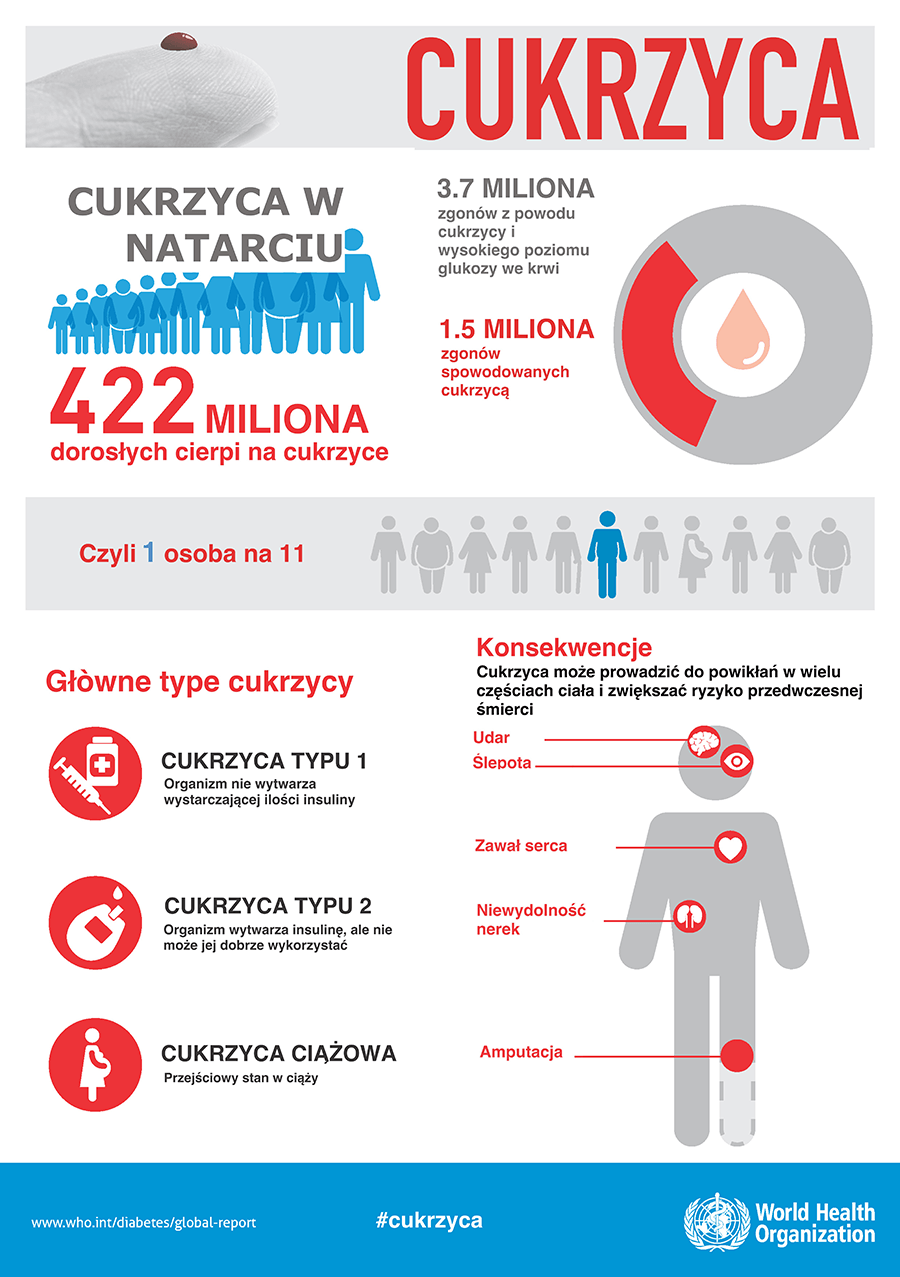Diabetes according to the World Health Organisation
According to the WHO, the problem of diabetes affects more than 422 million people worldwide.
There are approximately 1.6 million deaths each year attributed solely to the disease. The number of deaths in which diabetes is not the direct cause of death, but a co-morbid condition, reaches 3.7 million per year.
The growing trend over the last few decades is also worrying - the problem of diabetes has long since become a worldwide, universal health problem. Over the years, the problem has been increasing especially in poor and middle-income countries.
The World Health Organisation does not address the topic of 'Hemp oil and diabetes' in its reports. This issue remains outside the scope of its interest and statutory activities.

What is diabetes?
Diabetes belongs to a group of chronic metabolic diseases. It is characterised by elevated blood sugar levels. Abnormal sugar levels lead over time to damage to the heart, blood vessels, eyes, kidneys and nervous system. It can lead to stroke and amputation of limbs affected by diabetic foot.
Types of diabetes
The most common types of diabetes include:
Type 2 diabetes
The most common type of diabetes is type 2 diabetes. Statistically, older people are more likely to suffer from this type of diabetes. It occurs when the body develops resistance to insulin - the hormone responsible for transporting glucose from the blood into the cells - or when it produces too little insulin to transport the excessive amount of sugar supplied with food.
Type 2 diabetes refers to the inefficient use of insulin resources, the cause of which is most often excess body fat. It leads to hyperglycaemia - blood sugar levels that are too high.
In most cases, type 2 diabetes can be prevented with a healthy diet and physical exercise. There are also known cases of complete cure, understood as the possibility of discontinuing pharmacological drugs through drastic, permanent changes in eating habits and increased physical activity.
Type 1 diabetes
Formerly known as juvenile diabetes mellitus. It appears in childhood and is characterised by low or even no insulin production by the pancreas. It is a chronic disease requiring constant monitoring of blood sugar levels and the need for external insulin administration.
In this type of diabetes, an autoimmune process takes place, as a result of which the so-called beta pancreatic islands responsible for the production of insulin are destroyed. The ability to produce insulin is permanently switched off, so that the body does not have the hormone necessary to transport sugar from the blood into the cells. The sugar concentration rises, threatening the life of the patient.
Attention to a healthy lifestyle, a proper diet with a low glycaemic index and the delivery of insulin by subcutaneous injections allow patients to prolong their lives even into old age.
CBD and diabetes in the light of research to date
A problem worth mentioning at the outset is that, to date, studies on the use of CBD cannabidiol in diabetes have been carried out basically only on animals.
Just because something works in animals does not mean it will be the same in humans. Positive results from animal studies provide hope and point to directions for further research. CBD may or may not have identical or similar effects in humans.
Research is currently being conducted to clarify whether CBD in diabetes helps:
- Control blood sugar levels
- Calm the inflammation associated with the disease
- Minimise the level of neuralgia associated with nerve cell damage
We know from studies conducted to date on mice and rats in laboratory conditions that the use of CBD in diabetes:
- Reduced blood sugar levels
- Lowered levels of "bad" cholesterol
- Increased insulin production in the pancreas
- It minimised swelling and had an analgesic effect on neuropathic pains
- It acted as a preventive measure to minimise the risk of disease occurrence
- Supports proper fat metabolism in the body by modulating the conversion of white fat into brown fat
In light of these findings, it is hoped that similar mechanisms will work in humans and that effective hemp oil and diabetes will become a much more widely appreciated and recommended dietary component. Also in its supplementary variety, which is hemp oil cbd.
THC and Diabetes
In one study, CBD alone did not improve blood sugar levels. In contrast, combining CBD with THC reduced insulin resistance and improved insulin production.
This means that full spectrum CBD oil with legal THC content may have more supplement value than regular hemp seed oil.
Diabetes and cannabis - can cannabis use minimise diabetes risk
A US survey of 1,896 adults among whom 61% did not use cannabis and 39% used cannabis with varying frequency found that the prevalence of diabetes was lower among cannabis users than among those who did not use cannabis.
Surveys are of somewhat lower value because they do not explain the mechanisms behind the observed phenomena. This does not change the fact that fewer cases of diabetes were observed among cannabis smokers, which can be interpreted as a lower risk of the disease.
If cannabinoids from the smoking of dried hemp have had an observable positive effect on the prevalence of diabetes, it is likely that the same will be true of cannabinoids used as part of their supplementation with cbd oil.
Let us therefore proceed to clarify and answer the questions posed at the outset regarding the topic "hemp oil and diabetes".
Hemp oil and diabetes and the diabetic diet
Food grade, cold-pressed Hemp oil has propertieswhich make it a very valuable component of the daily diet. In fact, it belongs to the group of functional vegetable oils that you simply must have and use at home.
Diet for a diabetic is a topic worth exploring and adapting to your needs and situation based on valuable sources of knowledge. Some selected sources of knowledge can be found below the article.
Plant oils are an important part of nutritional treatment. They are a source of nutritional micronutrients and, in the case of hemp oil, of phytochemicals whose bioactivity is beneficial for people with both type 1 and type 2 diabetes.
It is worth paying attention to the purity of the hemp oil you intend to buy. Particularly the purity in terms of harmful pesticides is important.
The nutritional and functional values of hemp oil and the trace content of cannabinoids including CBD make it a valuable part of a diabetic diet. However, it should not be regarded as a medicine, but only as a beneficial nutritional component.
CBD oil - cannabinoid properties beneficial for the diabetic
CBD oil is already a supplementary form of hemp oil with a significantly higher content of health-promoting cannabinoids.
The content and action of CBD surrounded by other cannabinoids, terpenes and flavonoids means the presence of scientifically well-documented and highly appreciated properties in the anecdotal evidence:
- Anti-inflammatory
- Analgesic (also in minimising neuropathic pain)
- Neuroprotective
- Modulatory effects on the endocannabinoid system (responsible, among other things, for the body's energy metabolism and regenerative processes)
- Supporting healthy, restorative sleep
These are just a few of the most interesting ones from the point of view of people with diabetes.
You can read about other properties of cannabidiol here: CBD Properties
CBD oil, due to its cannabinoid content, can be successfully used by people with diabetes in the area of minimizing certain symptoms and minimise the risk of certain complications of the disease e.g. diabetic retinopathy leading to blindness (see below the article for the source of this information). Remember that hemp oil is not a medicine and is not used to prevent or treat diabetes.
The potential positive effects of hemp oil in diabetes are derived from the properties of hemp phytochemicals that support the normal function of the endocannabinoid system.
Diabetic foot and hemp dressing
Diabetic foot is associated with severe symptoms such as:
- Painful open wounds and ulcers
- Pain on the move and at rest
- Numbness in the feet
- Deformity, deformation leading to motor impairment of the body
Here, too, great hopes are pinned on hemp. To my knowledge, there is also quite advanced research in Poland into the use of hemp dressings to treat chronic, difficult-to-heal wounds.
I am happy to write more about it. The pictures I had the opportunity to see quite recently left me astonished. Chronic wounds that had previously failed to heal within a few months were closing up and regenerating very noticeably after the application of innovative cannabis dressings in a clinical setting. The action of these dressings is based on the properties of cannabinoids - the same ones you find in hemp oils.
I wonder if we will soon see a whole range of products based on cannabis and the unique properties of cannabinoids to support the treatment of diabetic symptoms precisely in terms of healing the wounds and ulcers that accompany the diabetic foot. Time will tell.
Sharing is caring:
You liked the article "Hemp oil and diabetes„?
Share it with your friends, colleagues and family. We would be delighted if, when using these materials, you would point to our blog as their source.
In the meantime, we encourage you to purchase cbd oil and hemp oil from our shop:
Sources used in the article 'Hemp oil and diabetes - hope or reality':
- https://bmjopen.bmj.com/content/2/1/e000494.full
- https://www.who.int/health-topics/diabetes#tab=tab_1
- https://diagnosis.pl/zdrowa-dieta-dla-cukrzyka
- https://www.kardiologia-i-diabetologia.pl/artykul/tluszcze-w-prewencji-i-leczeniu-cukrzycy-typu-2-ze-szczegolnym-uwzglednieniem-oleju-rzepakowego-jako-dobrego-zrodla-nienasyconych-kwasow-tluszczowych
- https://cukrzyca.pl/cukrzyca-typu-2/
- https://cukrzyca.pl/cukrzyca-typu-1/
- https://www.sciencedaily.com/releases/2006/02/060227184647.htm
You can find disclaimers regarding the content published on the pages of the knowledge base by clicking here.


